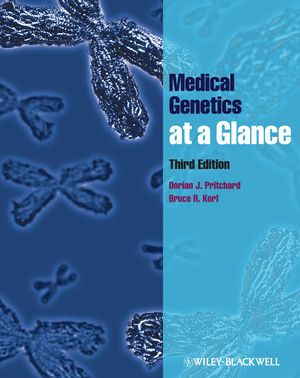Medical Genetics at a Glance,3/e
Medical Genetics at a Glance covers the core scientific principles necessary for an understanding of medical genetics
and its clinical applications, while also considering the social implications of genetic disorders.
This third edition has been fully updated to include the latest developments in the field, covering the most common
genetic anomalies, their diagnosis and management, in clear, concise and revision-friendly sections to complement any
health science course.
Medical Genetics at a Glance now has a completely revised structure, to make its content even more accessible. Other
features include:
?Three new chapters on Gene Identification, The Biology of Cancer, and Genomic Approaches to Cancer
?A much extended treatment of Biochemical Genetics
?A completely revised chapter on The Cell Cycle, explaining principles of biochemistry and genetics which are
fundamental to understanding cancer causation
?Two new chapters on Cardiac Developmental Pathology
?An extended Case Studies section
Providing a broad understanding of one of the most rapidly progressing topics in medicine, Medical Genetics at a Glance
is perfect for students of medicine, molecular biology, genetics and genetic counselling, and is a previous winner of a
BMA Award.
Part 1 Overview
1 The place of genetics in medicine 12
Part 2 The Mendelian approach
2 Pedigree drawing 14
3 Mendel뭩 laws 16
4 Principles of autosomal dominant inheritance and pharmacogenetics 19
5 Autosomal dominant inheritance, clinical examples 22
6 Autosomal recessive inheritance, principles 25
7 Consanguinity and major disabling autosomal recessive conditions 28
8 Autosomal recessive inheritance, life-threatening conditions 31
9 Aspects of dominance 34
10 X-linked and Y-linked inheritance 36
11 X-linked inheritance, clinical examples 38
12 Mitochondrial inheritance 40
13 Risk assessment in Mendelian conditions 42
Part 3 Basic cell biology
14 The cell 44
15 The chromosomes 46
16 The cell cycle 48
17 Biochemistry of the cell cycle 50
18 Gametogenesis 52
Part 4 Basic molecular biology
19 DNA structure 54
20 DNA replication 56
21 The structure of genes 58
22 Production of messenger RNA 60
23 Non-coding RNA 62
24 Protein synthesis 64
Part 5 Genetic variation
25 Types of genetic alterations 66
26 Mutagenesis and DNA repair 68
27 Genomic imprinting 70
28 Dynamic mutation 73
29 Normal polymorphism 76
30 Allele frequency 79
Part 6 Organization of the human genome
31 Genetic linkage and genetic association 82
32 Physical gene mapping 84
33 Gene identifi cation 86
34 Clinical application of linkage and association 88
Part 7 Cytogenetics
35 Chromosome analysis 90
36 Autosomal aneuploidies 92
37 Sex chromosome aneuploidies 94
38 Chromosome structural abnormalities 96
39 Chromosome structural abnormalities, clinical examples 98
40 Contiguous-gene and single-gene syndromes 102
Part 8 Embryology and congenital abnormalities
41 Human embryology in outline 106
42 Body patterning 108
43 Sexual differentiation 110
44 Abnormalities of sex determination 112
45 Congenital abnormalities, pre-embryonic, embryonic and of intrinsic causation 114
46 Congenital abnormalities arising at the fetal stage 117
47 Development of the heart 120
48 Cardiac abnormalities 122
49 Facial development and dysmorphology 124
Part 9 Multifactorial inheritance and twin studies
50 Principles of multifactorial disease 127
51 Multifactorial disease in children 130
52 Common disorders of adult life 133
53 Twin studies 136
Part 10 Cancer
54 The signal transduction cascade 138
55 The eight hallmarks of cancer 140
56 Familial cancers 142
57 Genomic approaches to cancer management 144
Part 11 Biochemical genetics
58 Disorders of amino acid metabolism 146
59 Disorders of carbohydrate metabolism 149
60 Metal transport, lipid metabolism and amino acid catabolism defects 152
61 Disorders of porphyrin and purine metabolism and the urea/ornithine cycle 156
62 Lysosomal, glycogen storage and peroxisomal diseases 160
63 Biochemical diagnosis 165
Part 12 Immunogenetics
64 Immunogenetics, cellular and molecular aspects 168
65 Genetic disorders of the immune system 170
66 Autoimmunity, HLA and transplantation 173
Part 13 Molecular diagnosis
67 DNA hybridization-based analysis systems 176
68 DNA sequencing 179
69 The polymerase chain reaction 182
70 DNA profiling 184
Part 14 Genetic counselling, disease management, ethical and social issues
71 Reproductive genetic counselling 186
72 Prenatal sampling 188
73 Avoidance and prevention of disease 191
74 Management of genetic disease 194
75 Ethical and social issues in clinical genetics 197
Self-assessment case studies: questions 200
Self-assessment case studies: answers 205
Glossary 214
Appendix 1: the human karyotype 219
Appendix 2: information sources and resources 220
Index 222


